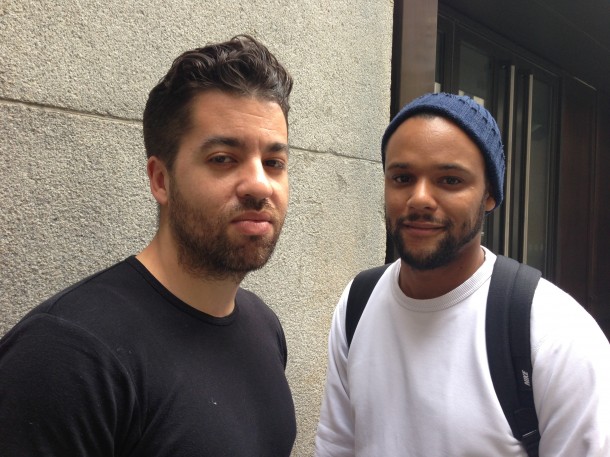By Keith Lewis, features editor
A heat wave, royal baby fever and a home-turf Wimbledon win. These are all factors that, pleasant as they may seem, are pretty inconsequential to the launch of Channel 4’s Brixton based drama, Run. But they were the justification for one London newspaper’s barely lukewarm reception to the series. They suggested its mood was out of sync with that of our euphoric, heat-stricken nation; it was, if you ask me, a review mired in summer lethargy itself.
As it goes, over two million tuned in for the first episode. Thankfully then, there are still some who think Britain runs deeper than picnic blankets, strawberries and a copy of Hello magazine.
And so, impressed with Run’s originality and success, I was looking forward to a coffee with Marlon Smith and Daniel Fajemisin-Duncan, two Brixton-born writers who penned the four-part drama.
‘Living and growing up together in Brixton,’ explained Marlon, ‘we wanted to avoid South London stereotypes – guns, gangs, those sort of things.’
Instead they wanted to explore the idea that in an urban environment, we live rubbing up against one another but we don’t really know each other. ‘You know, cheek by jowl,’ says Daniel.
They set out with humble aspirations. The pilot episode
of Run was self-financed and shot originally as an internet drama. Wives and girlfriends mucked in with the catering and they relied on guerrilla filming tactics by dodging permissions. But the drama soon morphed into something larger.
There are a number of things that make Run stand out. Firstly, it is not your typical TV drama.
‘It was difficult to strike the balance between asking the viewer to do some work and appealing to a TV audience’s natural tendency of wanting to follow a story through to the end,’ admits Daniel.
Therefore, the anthology format that they settled on carried inherent risks. It might well have been disappointing to those expecting a more conventional cradle to grave drama.
If you haven’t yet seen it, I am giving nothing away by saying that Run’s ending is merely pinched together. Marlon and Daniel were keen to leave room for the viewer’s own ideas and as such the series is littered with subtlety and nuance. Run is not dependent upon swathes of dialogue and what dialogue there is remains snappy and feels accurate. The episodes are not drowned in over explanation.
The danger was that it could have been considered better suited to a more niche market of short story enthusiasts. But it does better than that. As the viewing figures prove, it holds cross appeal.
And despite a tough urban edge there is a compassionate core to each story. Like a lot of good writing, Run leans on its characters for charm. Each episode offers a new dilemma that provokes independent sympathies. Tension is built very quickly through Run’s talented cast: Olivia Coleman (Peep Show, Tyrannosaur), Katie Leung (Harry Potter), Lennie James (Snatch) and Katharina Scuttle (The Promise) each shine as stars of the individual episodes.
The drama also touches on some subjects that are close to the writers. For example, Daniel’s parents have worked with local addicts and Lennie James’ story in Episode 3 draws on these personal empathies and curiosities.
‘Authenticity was also important to us,’ says Marlon. He explained that they were very prescriptive with location, based on their in depth knowledge of the area. They both reminisced that the fly on the wall shooting style had its challenges. The final result is fluid and genuine, however.
Many of Katie Leung’s scenes around Electric Avenue were ad-libbed. In fact, Daniel told me that in preparation for her role as a street seller Katie actually went out to sell DVDs, real time. ‘She even made some money,’ he laughed.
So, if this ostensible summer utopia has not entirely consumed you, or you feel that entertainment stretches to more than the birth of a royal, may I recommend Marlon and Daniel’s drama. Certainly, if C4 continue to replace the Big Brother slot with such quality dramas, I for one, will be a more regular viewer.
Run can still be caught on 4oD (until mid-August) and is now out on DVD.














If you don’t have the time to bake a treat yourself, you can always visit a chocolate shop and purchase handmade truffles to hand out.
This helps in adding the personal touch in the gifts. In general
nude portraits will be finished within five working days.